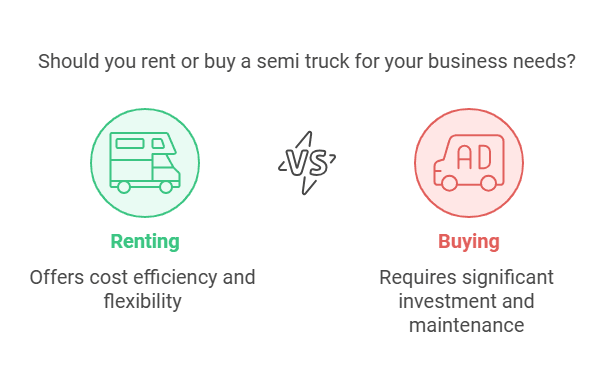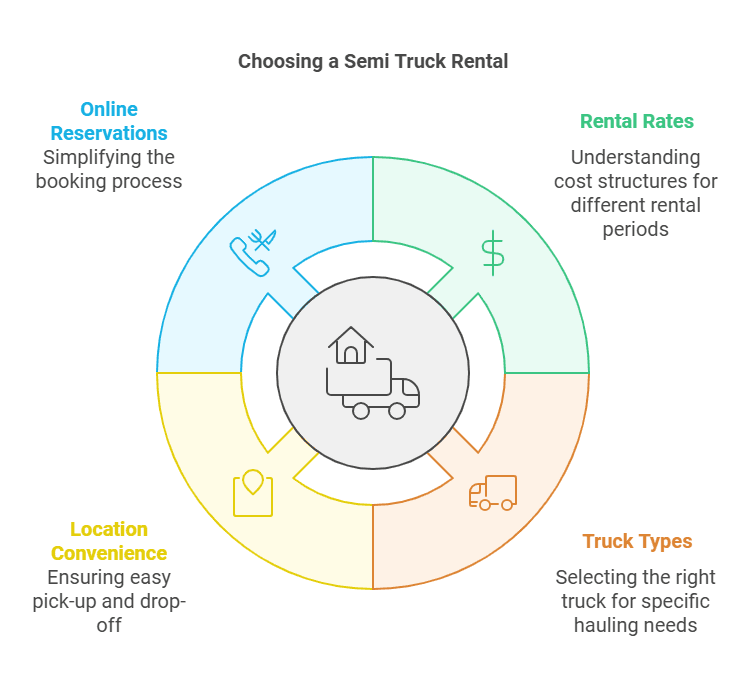Semi Truck Rental: 7 Essential Tips to Save 30% on Your Next Lease

Introduction
Navigating the complexities of heavy cargo transportation can be a formidable challenge, especially when considering options like semi truck rental. Whether you’re a business owner managing logistics or an individual needing to move large items, understanding how to rent a semi truck can make the process smoother and more cost-effective. In this comprehensive guide, we’ll explore everything from rental rates to picking up your truck, ensuring you have all the information needed for a successful rental experience.
Table of Contents
Understanding the Benefits of Semi Truck Rental
Why Rent Instead of Buy?
Choosing to rent a semi truck rather than purchasing one offers numerous advantages:
- Cost Efficiency: Avoid the significant upfront investment and ongoing maintenance costs associated with ownership.
- Flexibility: Adjust your fleet size according to demand without long-term commitments.
- Access to Latest Models: Enjoy the benefits of newer trucks with advanced features and better fuel efficiency.
- Reduced Liability: Rental agreements often include insurance and roadside assistance.
Who Can Benefit from Semi Truck Rentals?
- Small Businesses: Scale operations without the financial burden of owning a fleet.
- Independent Contractors: Take on larger jobs by accessing appropriate equipment.
- Event Organizers: Manage logistics for events requiring substantial transportation.
- Seasonal Operations: Increase capacity during peak seasons without permanent investments.

Key Considerations When Choosing a Semi Truck Rental Service
1. Rental Rates and Costs
Understanding semi truck rental cost structures is crucial:
- Daily Rates: Ideal for short-term needs. Prices can range from $170 to $215 per day.
- Weekly Rates: For extended projects, weekly rates offer better value.
- Monthly Rates: The most cost-effective for long-term rentals.
The American Transportation Research Institute’s latest operational costs report shows detailed breakdowns of trucking expenses.
Factors Affecting Rental Prices
- Truck Type: Specialized trucks (e.g., refrigerated, liftgate) may cost more.
- Rental Period: Longer rentals often come with discounted rates.
- Mileage: Some rentals include unlimited mileage; others charge per mile.
2. Types of Trucks and Trailers Available
- Semi Trucks: Standard tractors suitable for most hauling needs.
- Reefer Trucks: For transporting perishable goods. Learn about reefer trucks and reefer containers.
- Liftgate Trucks: Equip with hydraulic liftgates for easy loading and unloading.
- Boom Lift Trucks: Used for lifting heavy items vertically. Explore boom lift trucks.
3. Pick Up and Drop Off Locations
- Ensure the rental service has convenient pick up locations near you.
- Check if drop off locations differ and if there are any additional fees.
4. Online Reservations and Customer Support
- Opt for companies offering easy online reservations.
- Reliable support ensures assistance is available 24/7, crucial for handling unforeseen issues.

Steps to Renting a Semi Truck
Step 1: Determine Your Needs
- Cargo Requirements: Size, weight, and type of goods.
- Rental Duration: Short-term or long-term.
- Distance: Local deliveries or long-haul transportation.
Step 2: Research Rental Companies
- Look for companies with positive reviews and transparent pricing.
- Confirm they offer the specific truck and trailer types you need.
Step 3: Check Driver Qualifications
- Ensure you or your driver have the necessary licenses (CDL for most semi trucks).
- If exploring non-CDL options, consider straight trucks or box trucks.
The Federal Motor Carrier Safety Administration maintains current regulations for commercial vehicle operations.
Step 4: Reserve Your Truck
- Book ahead of time, preferably 48 hours before pickup, to guarantee availability.
- Provide all necessary documentation during reservation.
Step 5: Pickup and Inspection
- Arrive on time at the pickup location.
- Inspect the vehicle thoroughly for any pre-existing damage.
- Familiarize yourself with the truck’s features and controls.
Tips to Save Money on Semi Truck Rentals
Compare Semi Rental Rates
- Get quotes from multiple providers to find the best deal.
- Consider hidden fees like mileage charges and insurance.
Leverage Special Offers
- Some companies offer discounts for first-time renters or bulk rentals.
- Look out for seasonal promotions or loyalty programs.
Plan Your Routes Efficiently
- Optimize routes to reduce mileage and fuel consumption.
- Use planning tools or apps to avoid traffic and road restrictions.
Consider Semi Rental Near Me
- Renting locally can reduce costs associated with additional mileage and time.
- Support local businesses and build relationships for future needs.
Understanding Rental Agreements and Policies
Rental Period and Extensions
- Clarify the start and end dates of the rental period.
- Understand policies for extending the rental if needed.
Insurance and Liability
- Confirm what the rental company’s insurance covers.
- Consider additional coverage for peace of mind.
The Insurance Institute for Highway Safety provides comprehensive data on commercial vehicle safety standards.
Maintenance and Breakdown Procedures
- Know who is responsible for maintenance during the rental.
- Keep the 1-844-847-9577 number handy for emergencies or system errors.
Cancellation Policies
- Be aware of fees or penalties for canceling or changing reservations.
- Some companies require notice 24 hours before pickup to avoid charges.
Frequently Asked Questions
How Much Does It Cost to Rent a Semi Truck?
- Daily rates range from $170 to $215.
- Weekly and monthly rates offer savings for longer rentals.
- Costs vary based on truck type, rental duration, and mileage.
Can I Rent a Semi Truck Without a CDL?
- Operating a semi truck typically requires a Commercial Driver’s License.
- For non-CDL options, consider non-CDL driving jobs or renting smaller trucks.
What Is the Process to Rent a Tractor Trailer?
- Determine your transportation needs.
- Research and select a reputable rental company.
- Reserve the tractor trailer rental online or via phone.
- Provide necessary documentation and pick up the vehicle.
Are There Options to Rent a Semi Truck for a Day?
- Yes, many companies offer daily rentals.
- Ideal for short-term needs or trial runs.
- Ensure you understand the semi truck rental rates for short periods.

Additional Resources
- Starting a Food Business? Explore food trucks for rent for your venture.
- Interested in Trucking Careers? Learn if truck driving is a good career.
- Need Specialized Transport? Check out reefer trucking companies for temperature-sensitive goods.
- Exploring Vehicle Options? Discover the best first truck for your needs.
- Looking for CDL Opportunities? Find CDL jobs near me to advance your career.
Conclusion
Semi truck rental offers a practical and flexible solution for various transportation needs. By understanding rental rates, agreements, and how to choose the right service, you can optimize costs and ensure smooth operations. Whether you’re handling a one-time project or need to supplement your existing fleet, renting provides access to reliable equipment without the long-term commitment of a purchase.
Ready to take the next step? Explore your options, compare rates, and unlock the benefits of semi truck rental for your business today!
Optimize Your Rental Experience
Book Early and Plan Ahead
- Secure the best rates by booking in advance.
- Ensure availability, especially during peak seasons.
Stay Informed About Regulations
- Keep up-to-date with transportation laws and requirements.
- Adhere to weight limits and safety regulations to avoid fines.
Utilize Technology
- Use GPS and route planning apps for efficient deliveries.
- Stay connected with rental support for assistance.
Enhance Your Knowledge
For further insights into trucking and rentals:
- Understanding Truck Types: Dive into the differences between straight truck vs. truck tractor.
- Exploring Electric Options: Compare Rivian vs. Tesla for sustainable transportation.
- Considering Bulk Purchases? Check out bulk trucker hats for your team or events.
- Truck Driver Salaries: Learn about the Amazon truck driver salary and industry standards.
Remember, choosing the right semi truck rental can significantly impact your project’s success. By considering all factors and planning accordingly, you can ensure a cost-effective and efficient transportation solution.







